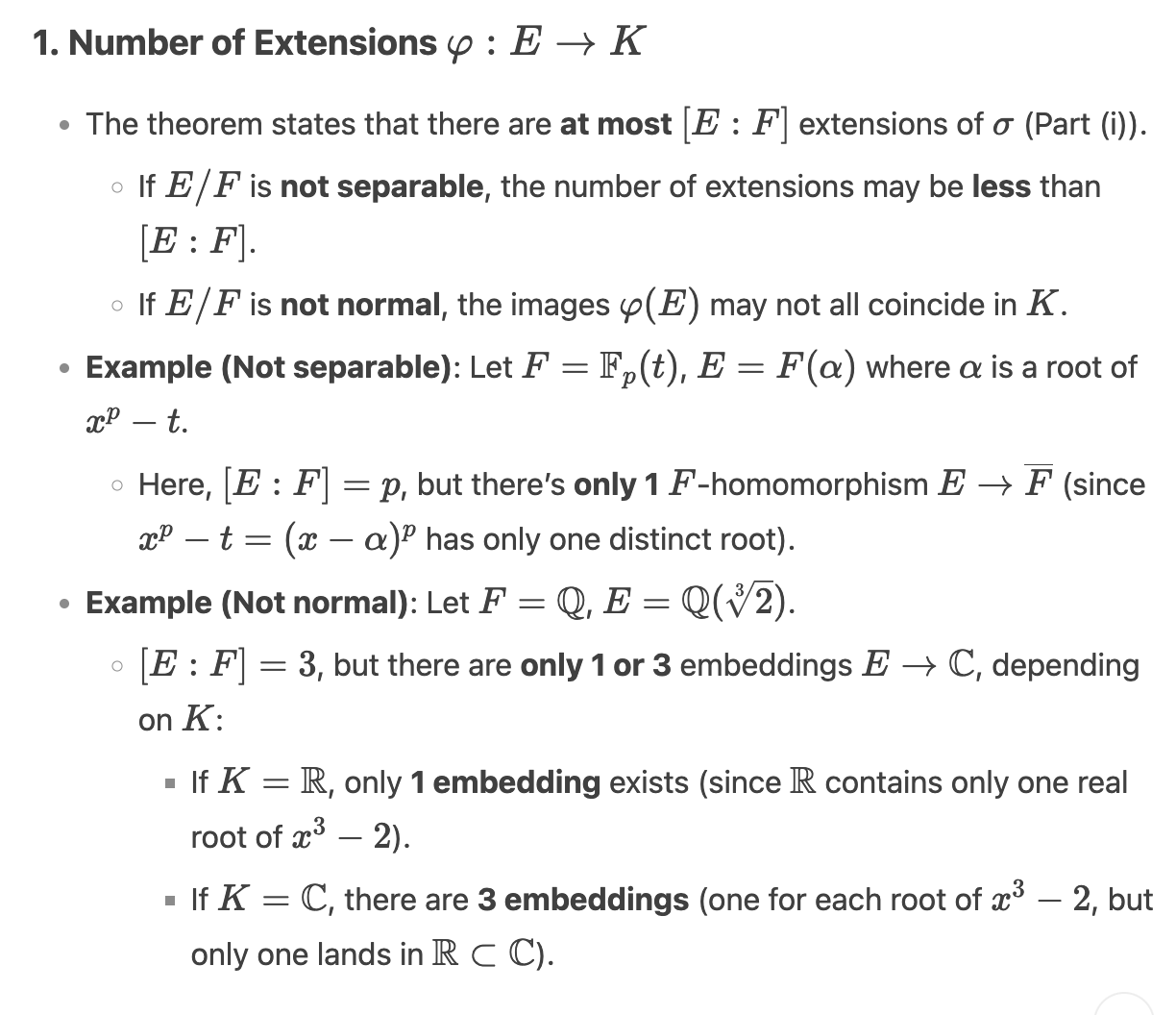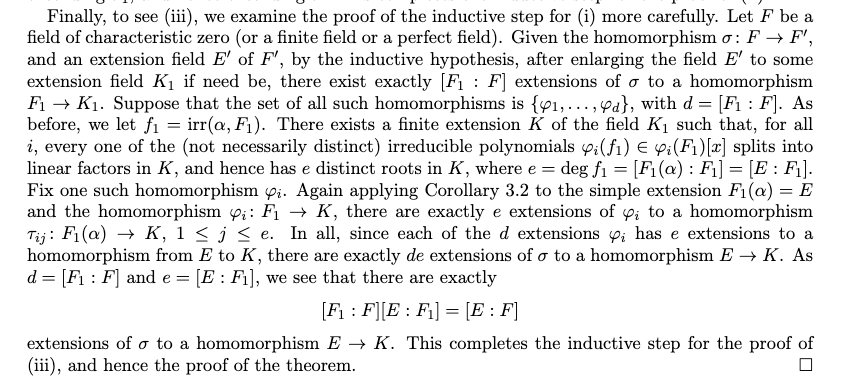Overview
The isomorphism extension theorem says that if are fields with finite extensions , respectively, then any ring homomorphism has at most extensions to homomorphisms , with equality if is of characteristic zero, finite, or perfect.
The proof of the theorem for simple extensions is a direct corollary of (Theorem) Universal property of simple field extensions, and the proof for general finite extensions proceeds by induction.
The theorem is especially interesting when and , in which case it counts the automorphisms of that fix :
In particular, this is an equality when is a Galois extension of . This is an important preliminary result for (Theorem) Fundamental theorem of Galois theory, which links intermediate fields to subgroups. wip

Preliminaries: Isomorphism extension theorem for simple extensions
Isomorphism extension theorem for simple extensions
Let be a simple extension of a field , meaning for some where is algebraic over , and let be a homomorphism. Then we have the following:
- (i) For every extension of , there exist at most homomorphisms extending , i.e., such that for all .
- (ii) There exists an extension field of and a homomorphism extending .
- (iii) If has characteristic (or is finite or perfect) and is an extension field of , then there exists an extension field of such that there are exactly homomorphisms extending .
Proof from Modern Algebra II.
- (i) From (Theorem) Universal property of simple field extensions, we know that the extensions of to a homomorphism are in one-to-one correspondence with the where is a root of , with . Since has at most roots in any extension field of , this implies that there are at most such extensions.
- (ii) Since (Theorem) Every nonconstant polynomial over a field has a root in some extension field, we can choose an extension field of such that has a root in . Thus (Theorem) Universal property of simple field extensions implies that there will be at least one homomorphism extending .
- (iii) From a corollary of (Theorem) Every nonconstant polynomial over a field has a root in some extension field, we can choose an extension field of such that factors into a product of linear factors in . If is perfect (i.e., is finite, has characteristic 0, or has characteristic and the Frobenius homomorphism is surjective), then from a result of Formal derivatives on polynomial rings we know that the irreducible polynomial has no multiple roots in any extension field. Then there are distinct roots of in , and hence (Theorem) Universal property of simple field extensions implies that there are different extensions of to a homomorphism .
Statement and proof of the theorem
Isomorphism extension theorem
Let be a finite extension of a field , and suppose is a homomorphism to another field . Then we have the following:
- (i) For every extension field of , there exist at most homomorphisms extending , i.e., such that for all .
- (ii) There exists an extension field of and a homomorphism extending .
- (iii) If has characteristic (or is finite or perfect) and is an extension field of , then there exists an extension field of such that there are exactly homomorphisms extending .
Proof from Modern Algebra II. Let
be a finite extension. We proceed by induction on , with the base case already proven for simple extensions. Let and , so we view as a simple extension, and we have a sequence of extensions . We first observe that that any extension of can itself be extended to a homomorphism , where is clearly also an extension of ; conversely, if is an extension of , then we can find an extension of to a homomorphism by simply taking the restriction .
- (i) By the inductive hypothesis, any homomorphism has at most extensions to homomorphisms ; let be the set of all such extensions. For each , the case implies there can be at most extensions of to homomorphisms . Then summing this for all extensions and applying the tower law for finite extension degrees, we see that there are extensions of to homomorphisms , as claimed.
- (ii) The inductive hypothesis implies that for , there is an extension , where is some field containing . Let . By (Theorem) Every nonconstant polynomial over a field has a root in some extension field, we can find an extension of such that has a root in (e.g., by formally adjoining a root to define , if there is not a root in already). Then it follows from the case that there is an extension of to a homomorphism , hence extending as well.
Corollary: An upper bound for the size of the Galois group

Code snippets
\text{ev}_\beta \circ \sigma
